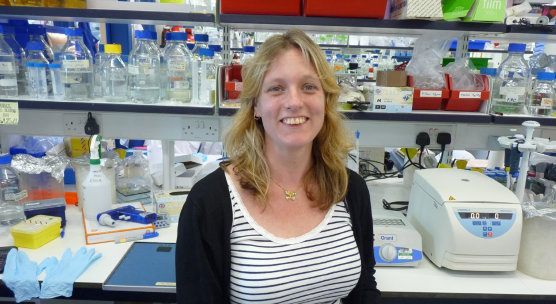€2million to investigate DNA damage and repair
Published On Thu 4 Feb 2016 by Grant Hill

A University of Dundee researcher has been awarded a prestigious €2million grant to investigate how DNA becomes damaged, leading to ageing and disease.
Dr Helen Walden, of the University’s School of Life Sciences, has been awarded the European Research Council (ERC) Consolidator Grant. The highly competitive awards are given to the best and most creative researchers working in Europe.
The funding will create four new research posts at the University’s Medical Research Council Protein Phosphorylation and Ubiquitylation Unit (MRC-PPU). Dr Walden and her team will look to discover how to repair the damage caused by two strands of DNA becoming chemically bound during replication, a process known as interstrand crosslinking.
DNA exists as a double-stranded structure coiled together to form a double-helix and replication is the process of producing two identical replicas from the original DNA molecule. This process occurs in all living organisms but crosslinking occurs in the human body around twice a day as a result of damage by chemicals, light and other causes. The body is normally able to undo the bind but in some instances this doesn’t happen, leading to cellular death and diseases such as cancer.
The pathway to repair this type of damage relies on the attachment of a signal to a protein called FANCD2. This signal is then read, translated, and ultimately removed. The Dundee team want to understand how the signal is created, what and how reads it, and how it is removed.
“Every time a cell divides it copies all genetic material,” said Dr Walden. “DNA replication is a fundamental process of the human body but the DNA helix needs to be unwound for it to take place. Interstrand crosslinking means this can’t take place and what we want to do is understand how this sort of DNA damage can be fixed.
“The body can normally clean up errors like crosslinking and we know modification of FANCD2 is a key signal to fix this particular type of DNA damage. What we don’t know is how it works, what switches it on and off and why it works more effectively in some people than others.
“We want to identify the various components of its pathway to understand how it chemically alters the DNA molecule. This is just one of a number of ways in which DNA can become damaged or mutate but if we can understand how the signal is turned on and off then it potentially allows us multiple points on which to interfere to prevent this type of disruption.”
Cancer cells are particularly susceptible to crosslinking because of the drugs used in the treatment process. This means that attempting to disrupt this pathway could one day lead to more potent chemotherapeutics.
Professor Dario Alessi, Director of the MRC-PPU, said, “I am delighted for Helen that she has received this prestigious award-and testament to the very important research that her laboratory is undertaking. I am confident that the work Helen is embarking on with the ERC funding will provide fundamental knowledge on how DNA integrity is maintained of relevance to better understanding and treating human diseases such as cancer.”
Notes to editors:
The European Research Council, set up by the European Union in 2007, is the first European funding organisation for excellent frontier research. Every year, it selects and funds the very best, creative researchers of any nationality and age, to run projects based in Europe. The ERC also strives to attract top researchers from anywhere in the world to come to Europe. To date, the ERC has funded more than 5,500 top researchers at various stages of their careers.
The ERC is led by an independent governing body, the Scientific Council, and, since January 2014, the ERC President is Professor Jean-Pierre Bourguignon. The ERC has a budget of over €13 billion for the years 2014-2020 and is part of the EU research and innovation programme, Horizon 2020, for which European Commissioner for Research, Innovation and Science Carlos Moedas is responsible.
ERC Consolidator Grants are given to top researchers of any nationality and age, with over 7 and up to 12 years of experience after PhD, and a scientific track record showing great promise. Host institutions should be based in the European Research Area (EU Member States plus countries associated with the EU research programme) and funding of up to €2.75 million for up to 5 years is available.
The University of Dundee is the top ranked University in the UK for biological sciences, according to the 2014 Research Excellence Framework.
Dundee is internationally recognised for the quality of its teaching and research and has a core mission to transform lives across society. More than 17,000 students are enrolled at Dundee, helping make the city Scotland’s most student-friendly.
The University is the central hub for a multi-million pound biotechnology sector in the east of Scotland, which now accounts for 16% of the local economy. www.dundee.ac.uk
For media enquiries contact:
Grant Hill
Press Officer
University of Dundee
Nethergate, Dundee, DD1 4HN
Tel: +44 (0)1382 384768
Mobile: 07854 953277
Email: g.hill@dundee.ac.uk